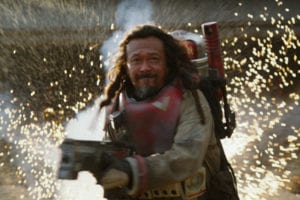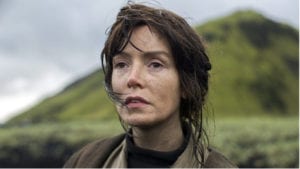In Rogue One, death of all but select few named characters became a key to success. Dave Filoni is criticized for not killing off all the Rebels characters. Game of Thrones made death toll a point of special pride and brags its creative team’s ability to off any character whatsoever. Shortly: we live in an era when amount of characters’ deaths, in and of itself, is perceived as a virtue of any given media.
But is it right?
Sure, death is a handy tool in any creator’s toolbox; but it requires mastery and precision. The only result of piling up dead bodies is, numbness and acedia. As you can’t feel sorry for every one killed, you stop feeling sorry. You stop empathizing because it brings nothing but pain. But helping your audience process their feelings about characters’ deaths is not all. There is more.
Death Must Not Feel Like A Tool
I’d just said it is a tool, right? But everything else is, too. There’s nothing truly natural in the world of sub-creation. It’s all made up. That doesn’t mean everything in our sub-creation shouldn’t feel natural.
A Russian playwright, Eugeny Schwartz, once said:
“It’s a shame to kill your character just to melt the cold hearts or to wake the indifferent.”
This is something his modern colleagues forget all too often. While it’s true that the author is behind every death in their creation, it is also true that the author has to establish certain laws for that creation and follow those laws.
If your character dies, it should be because there was no other option. Not because audience would cry when it happens; not because you don’t know what else to do with them. Anything but “no other option” would betray the authorial intent, which is not good in two ways:
- Distracts the audience from the even towards the author;
- Is a falsehood, which is never good.
Rogue One Example and Counter-Example
It’s easier to count deaths that had the benefit of being inevitable: K2-SO, Jyn, Cassian, Krennic, nameless soldiers on both sides. All other deaths were forced into narrative with extreme prejudice. I’m not saying those guys had to stay alive. I’m saying, the way they perished was not in any way natural.

But if I have to pick, let it be poor old Baze Malbus. His pal’s death was less egregiously forced. It was bad, but it was other kind of bad. With Baze, it’s just too messed up to be any good. I watched that moment several times, but I could not puzzle out why in the Galaxy did he suddenly go berserk after he was so calm and enlightened. Why did he suddenly forgot all the objectives, all the ideas, everything and just…er, went shouting to die senselessly?
The sheer inconsistency and unabashed tear-jerker’ness of this moment was too much even for this movie.
But let’s go have a look at Alexander Freed’s novelisation. Is it that pointless there? No, it isn’t. Because Freed was wise enough to take enlightenment away from this scene, and he wrote it instead as Baze’s pure despair. Baze lost everything; he thinks the mission had failed, he doesn’t believe he would ever be with his friend Chirrut again. So he takes what he sees as a last stand, to die fighting.
It’s not the best concept for oh so very hope-driven Rogue One; but it makes sense. It makes this death feel natural.
Death Has To Be Character-Driven
There is no accident in fiction. Nothing that happens in your narrative happens by chance. (Okay: nothing should happen by chance.) You control everything because you create everything. So, while in reality it is true that all too many people die just because they die, that’s not true for fiction.
When a character, however minor, dies in a spotlight that death must tell us something about the character. What kind of person they were? Why did they die this way? What does their death mean for the larger narrative? And for themselves? Why we audience should witness it and feel something?
The idea of crowning moment of death is popular one, but there has to be a head to put crown on. If the character had no character to begin with, why should we cheer whatever heroic deed they do? And same with the opposite: if we don’t know the guy and we don’t learn about them from the way they died, why should we despise them?
Rogue One Example And Counter-Example

Oh, Lyra. Poor, poor Lyra Erso. As it was not enough to be a fridged Disney mother, she had to rival Baze for the Most Pointless Death title. But you see, Baze has got something to characterize him apart of his death scene. Lyra? Not so much.
And the characterisation she receives is…is it at all? Let’s recap: her husband stays back to buy her and her daughter time to fly away; she is all calm and collected. Then she suddenly stops, tells her daughter to believe in the Force, comes back and threatens the bad guy with her blaster, shouting at him wearing Very Emotional Face. Shoots, is shot.
What does it tell us about her? I don’t know, really. That she’s hysterical, I guess? Actually, it doesn’t characterise her at all, because we have no idea why she does it. And it’s not like you can’t convey one’s thoughts and doubts in the visual media; just watch Amiyln Holdo’s last moments. It’s just that the creative team thought it was kinda sacrifice, so no need to explain anything. They were wrong, in my opinion.
And again, as the novelisation has a luxury of writing POVs there we can actually learn more than a bit about Lyra. We see that it was an informed decision, that she was sure Krennic would back off if threatened. It was a monumental decision, of course, but one based on analysis and on supposed knowledge about enemy’s weakness.
Ultimately, it presents us Lyra not as a hysterical fool, but as a keen mind able to think quick and make good tactical moves. The only thing that failed her was, that Krennic had changed with time. He was no longer a coward she knew.
So, we have two birds hit with one stone: we have a good characterisation of Lyra herself, but we have learned as much about our future main antagonist.
Death Has To Mean Something
And it has to be both for the audience and in-universe. We audience has to feel whole weight of death for it to have an effect on us. But death has to mean something in-universe, because if it has no effect on characters and world they live in, how can it affect the audience?
Let’s look into real life, and we’ll see that even in the worst periods of human history, even when and where people died constantly, death was still something special. It was still a tragedy, an abnormality that people didn’t want to grow accustomed to.
We learn it from Montaillou case archives, where Medieval smallfolk (against all common misconceptions) shamelessly grieves each and every child lost in infancy and goes great length to save them from death. Or we can learn it from the Great Plagues survivors’ journals. Or scarce journals and diaries of Holocaust survivors. Soldiers at war. Palliative care workers. All they encounter death on a daily basis, but they still feel its weight.
That’s the thing, that’s the important lesson to learn: real suffering doesn’t desensitize people the way an imagined one does. Of course, there may be exceptions, but general rule is, it’s the opposite.
So it doesn’t matter how many people you kill in your work; death has to mean something to them. They may be afraid or accepting, angry or looking forward to it, but there must be something. And they must feel at least something when they lose their important ones.
Rogue One Example And Counter-Example

I mean, the whole movie is an example. And please, don’t tell me that Star Wars never noticed anyone’s death. That’s just not true; while Leia certainly got a short stick on this matter with Alderaan, it was not the rule. Luke grieves Obi-Wan, and both twins grieve Han when they think he’s gone. And even Prequels never shied away from giving the characters a moment to process their loved ones’ deaths.
To have our main heroine lose on the course of the movie her mother, her father figure and her real father and give her no reaction on either was…beyond my understanding. I mean, it is consistent with Leia’s scripting, sure, but when she is more shaken by the fact a guy she’d just met was contemplating killing her father than her father’s actual death… Make of it what you will.
Anyway the only person who has something like a reaction on other’s death is, Baze Malbus. Not that it was a well-done reaction, but it was something humane, at least. Our main heroine cries her “No!” with no particular emotion, and then goes on as if nothing happened. And if those losses were nothing for her, why should they be something for us?
Why should we feel anything else then interest in how would they kill off the next one, if the characters don’t feel anything about losing each other?
Needless to say, the novelisation gets rid of this.
But Can We Compare?
Novelisation is, after all, a different medium. It allows an in-depth POV and other literary ways of conveying information. Visual media can’t do the same by their very nature. But you see, visual media have their own way of expressing characters’ thoughts and feelings. They have music, editing, operator’s work. Light, color—a thousand details that can make a picture.
Every single scene mentioned in this article (and many more, too) could be easily improved. If the Prequels managed it, Rogue One surely could. We can see it in the better moments of death: sure, we can very well see what K2-SO’s death is about, or what Krennic thinks and feels in his last moments. Those deaths have weight; they naturally grow from the narration and occur precisely when they have to occur. And they give us great insight into respective characters.
And No, I Don’t Hate Rogue One

I don’t love it, either, but I don’t hate it. Unlike Kylie, for example, I think Bodhi Rook is a better example of a defector in new Star Wars. I find Chirrut Îmwe an interesting idea of a character and Jedha a fantastic set piece. I don’t even dislike the overall idea of the movie and its plot.
I’m just really disappointed with the execution, and really happy the novelisation gave me what the movie promised. Cheers to Alexander Freed for that, but still bad that the movie itself couldn’t deliver it in the first place.

